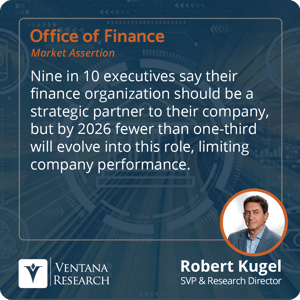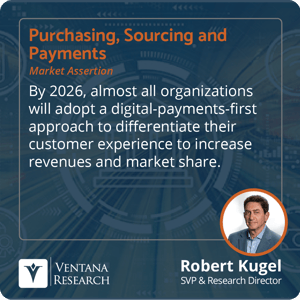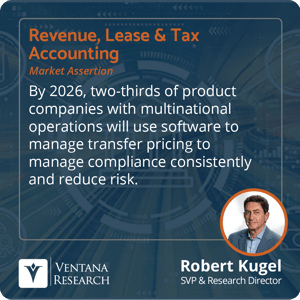Office of Finance 2023 Market Agenda: A Brave New World
Ventana Research recently announced its 2023 Market Agenda for the Office of Finance, continuing the guidance we have provided since 2003 on the practical use of technology for the finance and accounting department. Our insights and best practices aim to enable organizations to operate with agility and resiliency, improving performance and delivering greater value as a strategic partner.
We craft our annual Market Agenda using our firm’s expertise in business requirements – .png?width=400&height=200&name=Ventana_Research_2023_Market_Agenda_Logo%20(1).png) especially the complexities of accounting, tax and capital markets – combined with our knowledge of technology vendors and products. Our Finance practice has six focus areas: Business Planning, Enterprise Resource Planning and Continuous Accounting, Close, Consolidate and Report, Purchasing, Sourcing and Payments, Digital Finance and Revenue, Lease and Tax Accounting. As a result of our market research, we can offer insights and best practices to both lines of business and IT as well as across industry verticals, providing guidance that will help every organization reach its maximum potential.
especially the complexities of accounting, tax and capital markets – combined with our knowledge of technology vendors and products. Our Finance practice has six focus areas: Business Planning, Enterprise Resource Planning and Continuous Accounting, Close, Consolidate and Report, Purchasing, Sourcing and Payments, Digital Finance and Revenue, Lease and Tax Accounting. As a result of our market research, we can offer insights and best practices to both lines of business and IT as well as across industry verticals, providing guidance that will help every organization reach its maximum potential.
Historical eras almost always do not align perfectly with calendars, and the strands defining them begin years before they coalesce. For example, what delineated the 20th century as a distinct period began in 1914 with the “Great War,” and it’s likely that the pandemic will define the 21st century. More prosaically, the events of the pandemic caused an acceleration in the long-awaited adoption of digital technology by the office of finance as organizations were forced to adapt to remote working environments. “Virtual” is now the adjective of choice describing almost all core finance and accounting processes that, in many organizations, take place in a hybrid, in-office/at-home environment.
Yet, despite recent encouraging signs of faster technology adoption, transformation of departmental processes and practices is likely to evolve slowly because the key impediment remains the difficulty of changing organizational behavior, commonly referred to as “change management.” For that reason, although 9 in 10 executives say they want their finance and accounting department to be a strategic partner to their organization, fewer than one-third will evolve into this role by 2026, limiting their company’s performance.
remains the difficulty of changing organizational behavior, commonly referred to as “change management.” For that reason, although 9 in 10 executives say they want their finance and accounting department to be a strategic partner to their organization, fewer than one-third will evolve into this role by 2026, limiting their company’s performance.
To cope with this brave new world of digital transformation and adapt to rapidly changing markets and economic environments, organizations have accelerated conversion from manual processes to applications that enable finance and accounting professionals to eliminate rote, repetitive work and reallocate their time to projects requiring their knowledge and experience. In the coming decade, technology will transform how the finance and accounting department operates more so than over the past 50 years. Artificial intelligence, machine learning, bots, robotic process automation, enterprise data management, blockchain distributed ledgers, cloud computing and restructured architecture – these technologies will bring us closer to that longed-for state where computers adapt to the individual rather than requiring the individual to adapt to the shortcomings of computers. Technology will finally be able to transform all aspects of the office of finance, including accounting, planning and analytics, budgeting and closing.
Business Planning
Ventana Research coined the term “integrated business planning” 15 years ago to describe a process that supports enterprise-wide, high-participation, rapid-planning cycles. These cycles provide detailed answers to “what-if” questions in seconds or minutes, not hours or days. Budgeting and planning are simplified for business unit managers, and finance departments gain a detailed, forward-looking view of the income statement, balance sheet and cash flow. IBP employs technology such as in-memory computing, advanced analytics and interactive planning to make planning and budgeting processes more agile and easier. Our Business Planning Value Index and Benchmark Research for 2023 will focus on how financial planning and analysis groups can finally make planning and budgeting more of a business tool – one that is easier for budget owners to use – significantly enhancing the business value of these processes.
ERP and Continuous Accounting
Our 2023 research will highlight the transformational role of today’s enterprise resource planning systems and other maturing technologies. Continuous accounting is a technology-driven approach to managing transaction recording and accounting that takes advantage of current technology to streamline and restructure workloads. Continuous accounting provides organizations with more real-time information and insight. It also helps chief financial officers address two key challenges: cutting administrative overhead and attracting and retaining the best talent by eliminating unproductive and soul-deadening accounting chores. We will also examine how organizations are adopting a “virtual audit,” a transformation of the now-accepted remote audit that provides external auditors with limited, read-only access to key systems, significantly reducing staff workloads. We assert that by 2025, two-thirds of organizations will have applied continuous accounting principles to close the books within one business week, up from 50% today.
Close Consolidate and Report
Close, consolidate and report uses technology to streamline processes in the final stages of the accounting cycle, including close-management systems and dedicated consolidation software as well as applications for intercompany financial management, automated reconciliations and disclosure management. Our research will spotlight the increasing importance of using automation to enable organizations to speed the close while promoting accuracy and control, freeing up finance and accounting staff for more strategic tasks. Dedicated consolidation software has evolved, requiring less effort to implement and maintain, making it affordable and practical for many organizations that use standalone spreadsheets to manage statutory consolidations. In 2021, we introduced the term intercompany financial management, a discipline for structuring and handling transactions within a corporation and between its legal entities, designed to maximize staff efficiency and accounting accuracy while optimizing tax exposure, minimizing tax leakage and ensuring consistent tax and regulatory compliance. IFM addresses a significant (if often unrecognized) problem for many companies because performing IFM well requires the ability to execute the minutiae of statutory and tax accounting details effectively to support the achievement of high-level corporate objectives.
Purchasing, Sourcing and Payments
We’ve added purchasing, sourcing and payments to our focus areas to reflect new and important opportunities to use technology to gain effectiveness through greater efficiency. Purchasing ought to be a priority for digital transformation because, in most organizations, the function continues to operate primarily as it did in the middle of the 20th century. Purchasing should ensure that it is serving the organization’s needs in at least two vital respects: For its direct or strategic purchasing (goods and services that are an integral part of its offerings), it should be the informed buyer whose knowledge enables an organization to improve the quality, performance and cost of its products and services. Purchasing should also use technology to simplify the acquisition of so-called indirect goods and services (such as computers, office supplies and graphic design) while minimizing their cost and controlling outlays. Increasingly, organizations are adopting digital payment technologies to facilitate sales, reduce transaction costs, speed cash flow and achieve greater control. Ventana Research asserts that by 2026, almost all organizations will adopt a digital-payments-first to differentiate the customer experience to increase revenues and market share.
Purchasing ought to be a priority for digital transformation because, in most organizations, the function continues to operate primarily as it did in the middle of the 20th century. Purchasing should ensure that it is serving the organization’s needs in at least two vital respects: For its direct or strategic purchasing (goods and services that are an integral part of its offerings), it should be the informed buyer whose knowledge enables an organization to improve the quality, performance and cost of its products and services. Purchasing should also use technology to simplify the acquisition of so-called indirect goods and services (such as computers, office supplies and graphic design) while minimizing their cost and controlling outlays. Increasingly, organizations are adopting digital payment technologies to facilitate sales, reduce transaction costs, speed cash flow and achieve greater control. Ventana Research asserts that by 2026, almost all organizations will adopt a digital-payments-first to differentiate the customer experience to increase revenues and market share.
Digital Finance
Our 2023 research on this topic will explore how digital finance can shift the balance of the department’s work from transaction processing and reporting to forward-looking operational and financial analyses. Digital finance utilizes technology to eliminate rote, repetitive work while improving the quality of financial processes and financial statements. For example, global organizations with complex, intercompany transaction structures can use digital finance technology to reduce costs, increase control and enhance compliance. Through 2026, almost all multinational organizations that do not adopt IFM will struggle with profit leakage caused by lapses in handling value-added tax, income tax and transfer pricing decisions. These technologies, including AI/ML, RPA and blockchain distributed ledgers, will effect a profound change in the office of finance’s role, fueling a more substantial challenge to “we’ve always done it this way” inertia.
Revenue, Lease and Tax Accounting
Managing taxes challenges CFOs because statutory accounting and tax authority reporting requirements have become more demanding, increasing workloads. Rising tax rates and more rigorous enforcement make more focused tax management necessary. Using dedicated tax applications enables tax and accounting departments to operate more efficiently, giving them more time for tax analysis and planning to minimize tax expense as well as providing executives and boards greater transparency in tax provision and tax positions. For this reason, we assert that by 2026, two-thirds of product companies with multinational operations will use software to manage transfer pricing to achieve compliance consistently and reduce risk.
more rigorous enforcement make more focused tax management necessary. Using dedicated tax applications enables tax and accounting departments to operate more efficiently, giving them more time for tax analysis and planning to minimize tax expense as well as providing executives and boards greater transparency in tax provision and tax positions. For this reason, we assert that by 2026, two-thirds of product companies with multinational operations will use software to manage transfer pricing to achieve compliance consistently and reduce risk.
Organizations have already made significant investments in software to reduce the burden of recent revenue and lease-accounting standards, but some that have adopted a subscription or recurring revenue model are finding existing ERP systems inadequate for that business model. New standards are more principles-based, requiring effective process control and comprehensive disclosures.
Finance and accounting organizations turned a corner in 2020 and will continue to accelerate adoption of technology in 2023, increasingly embracing digitization. Subscribe to our Ventana Research community to stay up-to-date on our 2023 research efforts. Visit the Office of Finance page and focus areas for more research facts and best practices.
Regards,
Robert Kugel
Authors:

Robert Kugel
Executive Director, Business Research
Robert Kugel leads business software research for Ventana Research, now part of ISG. His team covers technology and applications spanning front- and back-office enterprise functions, and he personally runs the Office of Finance area of expertise. Rob is a CFA charter holder and a published author and thought leader on integrated business planning (IBP).










